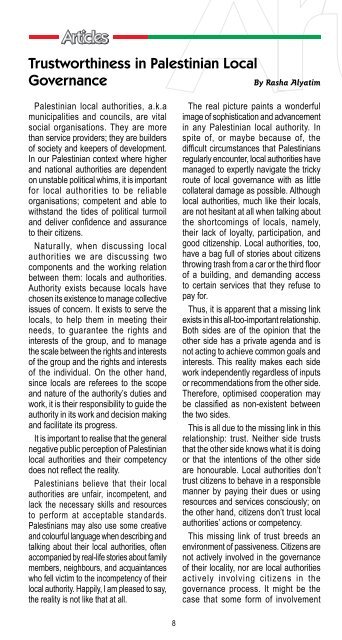Municipalities and Councils - Australians for Palestine
Municipalities and Councils - Australians for Palestine
Municipalities and Councils - Australians for Palestine
You also want an ePaper? Increase the reach of your titles
YUMPU automatically turns print PDFs into web optimized ePapers that Google loves.
Trustworthiness in Palestinian Local<br />
Governance By Rasha Alyatim<br />
Palestinian local authorities, a.k.a<br />
municipalities <strong>and</strong> councils, are vital<br />
social organisations. They are more<br />
than service providers; they are builders<br />
of society <strong>and</strong> keepers of development.<br />
In our Palestinian context where higher<br />
<strong>and</strong> national authorities are dependent<br />
on unstable political whims, it is important<br />
<strong>for</strong> local authorities to be reliable<br />
organisations; competent <strong>and</strong> able to<br />
withst<strong>and</strong> the tides of political turmoil<br />
<strong>and</strong> deliver confidence <strong>and</strong> assurance<br />
to their citizens.<br />
Naturally, when discussing local<br />
authorities we are discussing two<br />
components <strong>and</strong> the working relation<br />
between them: locals <strong>and</strong> authorities.<br />
Authority exists because locals have<br />
chosen its existence to manage collective<br />
issues of concern. It exists to serve the<br />
locals, to help them in meeting their<br />
needs, to guarantee the rights <strong>and</strong><br />
interests of the group, <strong>and</strong> to manage<br />
the scale between the rights <strong>and</strong> interests<br />
of the group <strong>and</strong> the rights <strong>and</strong> interests<br />
of the individual. On the other h<strong>and</strong>,<br />
since locals are referees to the scope<br />
<strong>and</strong> nature of the authority’s duties <strong>and</strong><br />
work, it is their responsibility to guide the<br />
authority in its work <strong>and</strong> decision making<br />
<strong>and</strong> facilitate its progress.<br />
It is important to realise that the general<br />
negative public perception of Palestinian<br />
local authorities <strong>and</strong> their competency<br />
does not reflect the reality.<br />
Palestinians believe that their local<br />
authorities are unfair, incompetent, <strong>and</strong><br />
lack the necessary skills <strong>and</strong> resources<br />
to per<strong>for</strong>m at acceptable st<strong>and</strong>ards.<br />
Palestinians may also use some creative<br />
<strong>and</strong> colourful language when describing <strong>and</strong><br />
talking about their local authorities, often<br />
accompanied by real-life stories about family<br />
members, neighbours, <strong>and</strong> acquaintances<br />
who fell victim to the incompetency of their<br />
local authority. Happily, I am pleased to say,<br />
the reality is not like that at all.<br />
8<br />
The real picture paints a wonderful<br />
image of sophistication <strong>and</strong> advancement<br />
in any Palestinian local authority. In<br />
spite of, or maybe because of, the<br />
difficult circumstances that Palestinians<br />
regularly encounter, local authorities have<br />
managed to expertly navigate the tricky<br />
route of local governance with as little<br />
collateral damage as possible. Although<br />
local authorities, much like their locals,<br />
are not hesitant at all when talking about<br />
the shortcomings of locals, namely,<br />
their lack of loyalty, participation, <strong>and</strong><br />
good citizenship. Local authorities, too,<br />
have a bag full of stories about citizens<br />
throwing trash from a car or the third floor<br />
of a building, <strong>and</strong> dem<strong>and</strong>ing access<br />
to certain services that they refuse to<br />
pay <strong>for</strong>.<br />
Thus, it is apparent that a missing link<br />
exists in this all-too-important relationship.<br />
Both sides are of the opinion that the<br />
other side has a private agenda <strong>and</strong> is<br />
not acting to achieve common goals <strong>and</strong><br />
interests. This reality makes each side<br />
work independently regardless of inputs<br />
or recommendations from the other side.<br />
There<strong>for</strong>e, optimised cooperation may<br />
be classified as non-existent between<br />
the two sides.<br />
This is all due to the missing link in this<br />
relationship: trust. Neither side trusts<br />
that the other side knows what it is doing<br />
or that the intentions of the other side<br />
are honourable. Local authorities don’t<br />
trust citizens to behave in a responsible<br />
manner by paying their dues or using<br />
resources <strong>and</strong> services consciously; on<br />
the other h<strong>and</strong>, citizens don’t trust local<br />
authorities’ actions or competency.<br />
This missing link of trust breeds an<br />
environment of passiveness. Citizens are<br />
not actively involved in the governance<br />
of their locality, nor are local authorities<br />
actively involving citizens in the<br />
governance process. It might be the<br />
case that some <strong>for</strong>m of involvement<br />
in governance takes place, but it’s<br />
subjected to the terms <strong>and</strong> conditions<br />
of internationally funded projects, not to<br />
citizens’ needs <strong>and</strong> dem<strong>and</strong>s.<br />
So, how to restore this trust?<br />
Well, first it is important to realise that it<br />
is an ongoing process of gaining trust <strong>and</strong><br />
keeping it. One single action or activity to<br />
build trust is never enough, no matter how<br />
big, but rather repeated <strong>and</strong> continuous<br />
actions will decide the trustworthiness of<br />
involved sides.<br />
Road construction in Ramallah. Photo by Yousef Shakarne.<br />
This is the second element to realise<br />
when working to restore trust; each side<br />
– citizens <strong>and</strong> local authorities – has to<br />
prove its trustworthiness to the other side.<br />
Since the relationship between locals <strong>and</strong><br />
their authority is a dynamic one, both<br />
sides share the responsibility of making<br />
this relationship, <strong>and</strong>, in turn, their locality,<br />
prosper <strong>and</strong> thrive.<br />
After understating these two elements<br />
comes the actual process of restoring<br />
trust. Good indicators of trustworthiness<br />
9<br />
are ethics, participation, <strong>and</strong> competency.<br />
The ethics indicator refers to practicing <strong>and</strong><br />
applying values such as accountability,<br />
transparency, integrity, fairness, <strong>and</strong> rule<br />
of law. The participation indicator refers<br />
to engaging citizens broadly <strong>and</strong> freely<br />
in local governance decision making.<br />
The competency indicator refers to the<br />
level of skills <strong>and</strong> resources needed to<br />
develop local governance. Bringing these<br />
indicators together in practice by citizens<br />
<strong>and</strong> locals should result in restoring trust.<br />
One indicator I want to emphasise<br />
here is transparency. The governing<br />
process in <strong>Palestine</strong> is surrounded<br />
by a mystic aura of secrecy; it is the<br />
norm <strong>for</strong> things to be hidden <strong>and</strong><br />
confidential amongst a very small<br />
number of people. The reasoning,<br />
it is argued, is that there is no value<br />
in making things publicly known,<br />
as the very popular Palestinian<br />
proverb goes, “Too many cooks<br />
spoil the cooking.” This mentality



